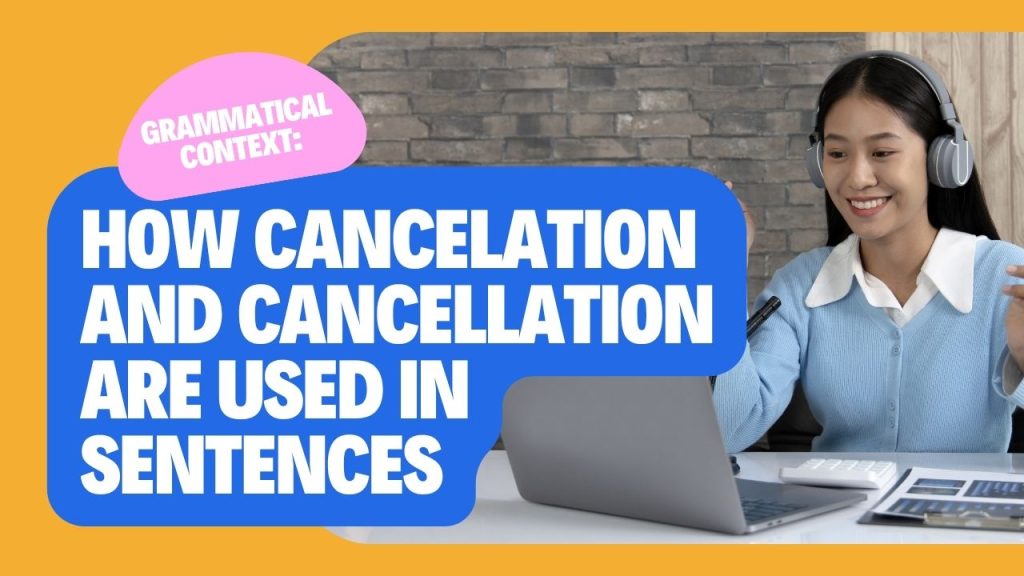Cancelation vs Cancellation: Understanding the Key Difference
English can be a quirky language, can’t it? Just when you think you’ve nailed the spelling of a word, a variation shows up to throw a wrench in the works. That’s exactly the case with “cancelation” and “cancellation”. They look similar. They mean the same thing. But one has an extra “l”—and that one tiny letter has sparked countless spelling debates over the years.
So what’s the deal? Are both spellings acceptable? Do they mean different things? Or is one just plain wrong? Let’s clear the fog and get to the heart of the matter.

The Correct Spelling: Cancelation or Cancellation?
Let’s start with the bottom line: “cancellation”—with two Ls—is generally considered the correct spelling in most English-speaking countries. It’s the version you’ll find in the Oxford English Dictionary, on BBC websites, and in pretty much every British English grammar guide.
But here’s the twist: “cancelation” isn’t technically wrong. It’s a less common variant, and it shows up occasionally in American English. However, even in the U.S., “cancellation” is far more widely used.
To put some numbers behind it: A quick look through Google’s Ngram Viewer (which tracks the usage of words across a massive library of books) shows that “cancellation” has consistently been more popular by a wide margin—across decades.
So, if you’re wondering which version to use in a professional document, article, or email, you’re almost always safer going with “cancellation.”

Regional Variations: Where Each Spelling Is Used
Alright, let’s talk geography. The whole one-L vs. two-L thing isn’t random—it actually follows a pattern that appears in other words too. Think “traveler” vs. “traveller”, or “labeling” vs. “labelling.”
In British English, words that add a suffix like -ation tend to double the consonant. That’s why “cancellation” is the standard there.
Here is a table of common words that show this difference:
| Base Word | British English | American English |
|---|---|---|
| travel | travelling, travelled | traveling, traveled |
| cancel | cancelling, cancelled | canceling, canceled |
| enrol | enrolling, enrolled | enrolling, enrolled |
| fuel | fuelling, fuelled | fueling, fueled |
| label | labelling, labelled | labeling, labeled |
| model | modelling, modelled | modeling, modeled |
| quarrel | quarrelling, quarrelled | quarreling, quarreled |
| signal | signalling, signalled | signaling, signaled |
| tunnel | tunnelling, tunnelled | tunneling, tunneled |
| marvel | marvelling, marvelled | marveling, marveled |
In American English, the rule is a bit looser. While Americans do double consonants in some words (like “running” or “hopping”), when it comes to nouns like “cancelation,” the single L sometimes slips through. That said, most American dictionaries—including Merriam-Webster—still list “cancellation” as the preferred form.
So if you’re writing for an international audience or want to stick with the most widely accepted spelling, go with the double-L version. But if your style guide or client insists on American English and prefers minimalism, “cancelation” might sneak in.

Grammatical Context: How Cancelation and Cancellation Are Used in Sentences
Here’s the thing: whether you use “cancelation” or “cancellation,” the grammatical function is the same. Both are nouns that refer to the act of canceling something—whether it’s a flight, a meeting, a subscription, or a TV show.
Examples:
- “The cancellation of the concert disappointed fans across the city.”
- “Due to unforeseen circumstances, we received notice of the cancellation via email.”
If you swap in “cancelation” for “cancellation” in either sentence, the meaning stays intact, but the spelling might raise some eyebrows, depending on your audience.
Also worth noting: the verb form is always “cancel.” That doesn’t change. So you’d write:
- “They had to cancel their vacation due to weather issues.”
- “She wants to cancel her gym membership next month.”
The confusion only creeps in with the noun form, which leads us right back to the great spelling showdown.
Why Does the Confusion Exist in the First Place?
Blame it on history—or, more precisely, on how English evolved. British English has always leaned heavily on its Latin and French roots, which tend to double consonants before adding suffixes. American English, on the other hand, has gone through waves of simplification.
Back in the 19th and early 20th centuries, there was a big push in the U.S. to simplify spelling across the board. Think of it as the linguistic equivalent of streamlining your closet: out went unnecessary letters, doubled consonants, and silent vowels. That’s how “colour” became “color” and “theatre” became “theater.”
“Cancelation” rode that wave of simplification—but never fully took hold. It remained more of an outlier, occasionally used but rarely dominant.
Conclusion
To recap (because who doesn’t love a good summary?):
- “Cancellation” is the standard, widely accepted spelling—especially in British English and even in most American contexts.
- “Cancelation” exists, but it’s rare and not typically recommended unless you have a very specific reason (like following a quirky American style guide).
- The meaning and grammatical use are identical, so the choice really comes down to consistency and audience.
So next time you’re staring at a blank screen wondering whether to go with one L or two, just remember: when in doubt, add the second L. It’s the safer bet, and your spellcheck—and probably your editor—will thank you.



